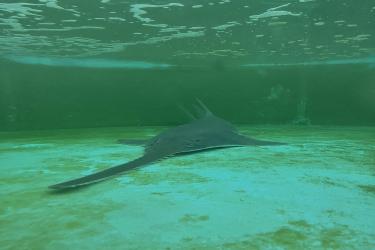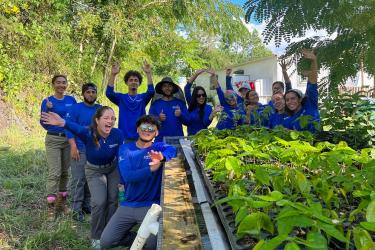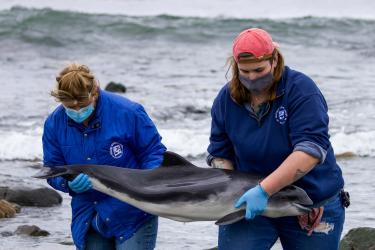Federal action agencies which fund, permit, or carry out activities are required to consult with NOAA Fisheries regarding the potential impacts of their actions on certain trust resources including threatened or endangered species, or their critical habitat listed under the Endangered Species Act (ESA) or essential fish habitat (EFH) identified and described in accordance with the Magnuson-Stevens Fishery Conservation and Management Act.
The EFH regulations (50 CFR 600.920(a)(1) recognize the necessity to respond immediately to emergencies and provide expedited consultation allowing federal agencies to complete their critical missions in a timely manner while providing the protections afforded to EFH.
An emergency is a situation involving an act of God, disasters, casualties, national defense or security emergencies, etc., and includes response activities that must be taken to prevent imminent loss of human life or property. During an emergency a federal agency may not have the time for the administrative work required by normal consultation procedures. Emergency consultation expedites communication and allows agencies to incorporate endangered species and EFH concerns into their emergency response plans.
During any emergency, NOAA Fisheries' primary objective is to provide technical advice and recommendations for minimizing adverse effects to listed species during emergency response activities. During emergency events, the primary objective of the responding agency is to protect human life and property and this objective takes precedence if there is a conflict with protective measures for EFH. The protection of EFH is warranted when it will not interfere with the emergency response to protect human life and property.
EFH Emergency Consultation Process:
Accidental Discharges of Oil and Hazardous Materials
EFH Best Management Practices (EFH BMPs) for Certain Response Activities to Accidental Discharges of Oil and Other Hazardous Materials (PDF 17 pages) have been prepared by NOAA Fisheries, Southeast Region, Habitat Conservation Division (HCD) to serve as EFH conservation recommendations to minimize impacts to EFH for certain, frequently utilized, emergency response activities approved by U.S. Coast Guard (USCG) and/or Environmental Protection Agency (EPA). [NOTE: At this time, these BMPs are not intended to satisfy any requirements of the Endangered Species Act.] The EFH BMPs are intended as general guidelines when response options are being considered by the USCG and/or EPA. EFH conservation recommendations are advisory and these EFH BMPs may be adapted as warranted to protect human life, prevent significant loss of property, and protection of the environment. The USCG and/or EPA should consult with the HCD after-the-fact when response activities result in unexpected or unanticipated adverse effects to habitats identified and described as EFH. The primary purpose of an after-the-fact consultation to emergency response activities will be to gather and analyze lessons-learned to inform revisions to the EFH BMPs and future response activities.
Other Emergencies
If the emergency is not related to a release of oil or other hazardous material, or the above EFH BMPs are not applicable, then emergency consultation should occur. In these instances, emergency EFH consultation should be conducted in accordance with Endangered Species Act Emergency Response Process which also provides notification to HCD personnel for Emergency EFH Consultation as well. A single email has been established in the Southeast Region for both ESA and EFH Emergency Consultations at nmfs.ser.emergency.consult@noaa.gov.


